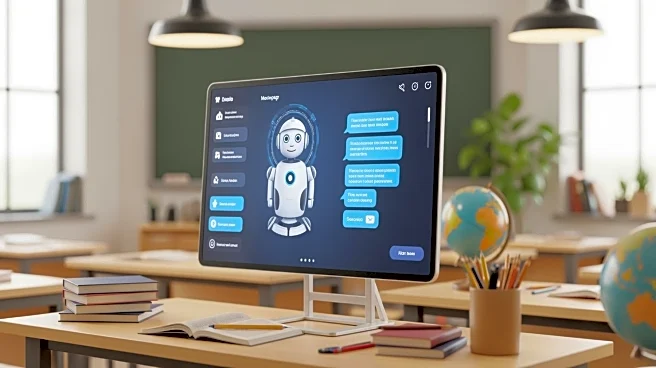What's Happening?
Major technology companies, including Microsoft, OpenAI, and Anthropic, are investing millions of dollars to train teachers on artificial intelligence (AI) applications in education. The American Federation
of Teachers (AFT), the second-largest teachers union in the U.S., has partnered with these companies to enhance AI literacy among educators. Microsoft is contributing $12.5 million over five years, OpenAI is providing $8 million in funding and $2 million in technical resources, and Anthropic has offered $500,000. This initiative aims to build an AI training hub in New York City, with plans to open additional hubs and train 400,000 teachers over the next five years. The National Education Association (NEA) has also partnered with Microsoft, receiving a $325,000 grant to develop AI training programs for its members.
Why It's Important?
The integration of AI in education is crucial as it prepares students for a future where technology plays a significant role. By training teachers, these tech companies are not only enhancing educational methods but also positioning themselves as key players in the educational sector. This partnership reflects a strategic move to influence the next generation of technology users and potentially expand their market reach. The initiative also addresses the growing need for AI literacy in schools, ensuring that educators are equipped to use AI tools effectively and responsibly. However, it raises questions about the influence of private companies in public education and the potential for AI to replace traditional teaching methods.
What's Next?
The AFT plans to open more AI training hubs and expand its reach to train hundreds of thousands of teachers. As AI becomes more integrated into educational practices, schools may increasingly rely on these technologies for lesson planning and student engagement. The federal government has encouraged private investment in AI education, creating an AI Education Task Force to achieve global dominance in artificial intelligence. This could lead to more partnerships between tech companies and educational institutions, further embedding AI into the fabric of U.S. education.
Beyond the Headlines
The ethical implications of AI in education are significant, as it could change the dynamics of teaching and learning. There is a need to balance technological advancement with the preservation of critical thinking skills and personal interaction in classrooms. The involvement of tech companies in education also raises concerns about data privacy and the commercialization of education. Educators and policymakers must navigate these challenges to ensure that AI serves as a beneficial tool rather than a disruptive force.









